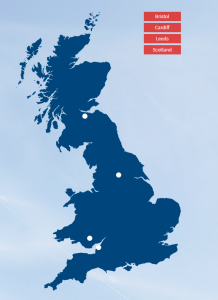
Disclosure during Financial Remedy Proceedings : ‘Self-Help’ to financial documents
Lyons Davidson Limited is dedicated to promoting equal opportunities for all through our operations and services. We have developed a culture which promotes and stands against any form of discrimination or exploitation, including that of modern slavery and human trafficking. Our core values outline our commitment to acting responsibly, supporting our local communities, investing in our people and encouraging diversity and accessibility; meeting the varied needs of our clients.
As part of the legal sector, we recognise that we have a responsibility to take a robust approach to modern slavery and human trafficking. We are committed to preventing modern slavery and human trafficking in our corporate activities, and to ensuring that our supply chains are free from modern slavery and human trafficking and comply with our values.
As part of our on-going strategy to raise awareness of obligations for businesses, we are continuing to work in collaboration with STOP THE TRAFFIK, a leading NGO focused on working with businesses and vulnerable communities to prevent modern slavery. We are looking to strengthen our own reporting processes whilst also sharing modern slavery best practice throughout our networks.
STOP THE TRAFFIK: “We are excited about working together with Lyons Davidson to develop their modern slavery risk mitigation strategy. Lyons Davidson’s position within the sector provides a unique position to promote best practice for modern slavery prevention and we are looking forward to working collaboratively in this vital area.”
Last year, STOP THE TRAFFIK agreed to assist Lyons Davidson in two projects – modern slavery awareness raising training and a risk mapping of Lyons Davidson’s supplier list. These projects have been delayed due to COVID and resourcing issues; however, this will be a focus in the next year. In the Queen’s Speech on 10th May 2022, new amendments to the Modern Slavery Act 2015 were confirmed in the form of a new Modern Slavery Bill. This Bill will increase due diligence requirements for businesses and their supply chains, and will strengthen mandatory requirements, as well as provide further recommendations, around annual modern slavery statements. The Bill outlines that changes to modern slavery statements will include requiring businesses to detail actions taken to address supply chain risk and confirm the training provided on modern slavery.
To that effect, STOP THE TRAFFIK will provide a training deck that will start to raise awareness across Lyons Davidson’s team about modern slavery, and the risks it poses to their business. Other projects, including supply chain risk mapping, will take place throughout the second half of 2022.
Lyons Davidson fully supports the UK’s Modern Slavery Act 2015 (the Act) and the provisions set out. This statement, made pursuant to section 54(1) of the Modern Slavery Act 2015, sets out Lyons Davidson Limited’s actions to assess potential modern slavery risks related to its business and to put in place steps aimed at ensuring that there is no modern slavery or human trafficking in its own business and its supply chains. This statement relates to actions and activities during the financial year 1 December 2020- 31 November 2021 and has been approved by the Board of Directors.
This policy covers the activities of Lyons Davidson Limited, Lyons Davidson Scotland LLP and File Dynamics Limited (LDL/FDL).
LDL is a law firm providing legal services to businesses and individuals nationwide. File Dynamics Limited provides support functions to the business.

Across LDL and FDL we operate an agile working policy meaning that most colleagues share their working week between working at home and working in one of the LDL offices based in three locations in England and Wales together with its associated practice in Edinburgh.
LDL and FDL employ around 566 team members.
Our supply chain comprises of suppliers as expected in the running of a legal services office including: experts instructed to provide advice to our clients; counsel; facilities services; recruitment agencies; training providers and equipment providers.
The Company only operates in the UK.
Responsibility for our anti-modern slavery initiatives is as follows:
The following policies are relevant to our approach to the identification of modern slavery risks and the steps to be taken to prevent modern slavery and human trafficking in our operations:
Annually we undertake a risk assessment which includes determining the level of modern slavery and human trafficking risk to our business, for our employees, clients and within our supply chain.
Although we acknowledge that our risk of modern slavery is relatively low considering we operate in the professional services sector, we acknowledge that no business is without risk. Additionally, we recognise the associated risk that operating as a national law firm brings with it.
Thus, although we recognise that there is a low risk for our employees, operating in professional service roles which have a low risk for modern slavery, our recruitment policies and processes include appropriate checks on all new employees and regular meetings to ensure that all our staff are safe and supported.
Our supply chain is likely to be where the highest risk of modern slavery lies for our company. We have assessed that our high-risk suppliers are likely to provide facilities services, manufactured products, and construction and refurbishment.
In order to assess the risk inherent in our supply chain and produce an appropriate action plan to manage that risk, we will be conducting a supply chain risk mapping with STOP THE TRAFFIK over the second half of 2022. This risk mapping of our Tier 1 suppliers will develop a strategic overview of the inherent modern slavery risk in our supply chain by ranking suppliers by their modern slavery risk in both their sector and country of operation. This will create a list of suppliers who will be prioritised in modern slavery due diligence processes over the course of the following years.
Any risks identified from the above processes will be prioritised and dealt with in accordance with comments set out below.
As outlined above, we recognise that our highest risk is within our supply chains. Our supply chain risk mapping will identify suppliers which need to be prioritised in our modern slavery due diligence practices. It is anticipated that the highest risk suppliers, warranting enhanced due diligence, are likely to provide facilities services, manufactured products, and construction and refurbishment.
In general, we undertake due diligence when considering taking on all new suppliers, and when reviewing existing suppliers. These mitigating steps include:
Where a potential frequent supplier is unwilling to co-operate with our enquiries, considering if that is a business relationship we wish to start.
In the past year, due to the ongoing impact that the COVID-19 pandemic has had on our business and operations, our training on modern slavery and human trafficking has been delayed. However, our aim for the coming year is to work in conjunction with STOP THE TRAFFIK in order to help our staff better understand and respond to identified modern slavery and human trafficking risks. This will include:
We understand the importance of measuring our performance against our commitment to preventing modern slavery and human trafficking. In order to assess the effectiveness of our approach to modern slavery, we will be reviewing on an annual basis the following key performance indicators:
Throughout the coming year, in order to meet our commitment to prevent modern slavery and maintain human rights in our operations and supply chain, we are committing to following these next steps:
This statement covers the financial period December 2020 to November 2021 and has been approved by the Board of Directors on 7 June 2022, who will review and update it annually.
| Signed by | Date |
| Alex Hewitt
Compliance Director |
07/06/2022 |
Click here to view the 2021 Modern Slavery and Human Trafficking Statement.
Please complete this form, including a brief description of how we can help you, and we will contact you as soon as we can to discuss the matter informally and without charge.